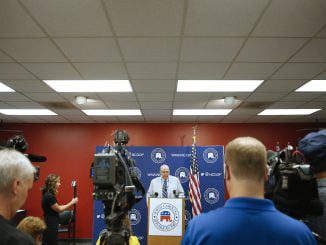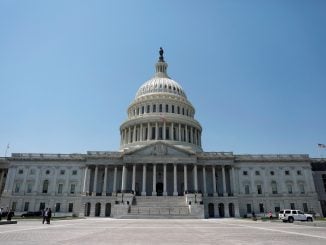
RALEGH — The governor versus legislature court battle over a merged Elections and Ethics Enforcement board is over. After nearly a year of litigation, a unanimous three-judge panel rejected Gov. Roy Cooper’s argument that the merged Bipartisan State Board of Elections and Ethics Enforcement usurped his executive power, but it also said that the part of the original board merger law relating to membership and appointment is void.
The North Carolina Superior Court panel preserved the law that joined the N.C. Ethics Commission and the N.C. Board of Elections into one governor-appointed board made up of equal numbers of Democrats and Republicans, amended in H.B. 90 to add a ninth, unaffiliated member. Cooper and his lawyers argued that because the old system allowed him to appoint a majority of the elections board from his party, lawmakers were stripping him of power to implement his preferred policies.
“We appreciate the court preserved a merged bipartisan elections and ethics board, which polling shows nearly 80 percent of North Carolinians support, and rejected Gov. Roy Cooper’s arguments to resurrect a law that was already taken off the books just because his party would benefit,” said Senate Leader Phil Berger (R-Rockingham) and House Speaker Tim Moore (R-Cleveland) in a joint statement released Monday evening. “We have addressed the court’s concerns about the board’s membership in a bill Gov. Cooper has already promised to allow to become law, and we once again encourage him to abandon taxpayer-funded and self-serving lawsuits.”
In January, the N.C. Supreme Court voted along party lines to send the case back to the three-judge panel after overruling the lower court’s determination that Cooper lacked standing entirely and saying that parts of the original board merger law set up risk of deadlock and stripped the governor of his executive authority. As a result of that decision, Cooper’s lawyers argued to the three-judge panel that they should toss out the new merged board completely and return to the original system with two boards.
The N.C. Supreme Court’s majority opinion said the membership of and appointment to the bipartisan board did not give the governor enough control over the board, but Justice Paul Newby dissented saying that given the board’s importance in ensuring fair elections, it should be bipartisan and that the elected General Assembly has the power to establish the rules of the appointments, not the governor.
“The only separation of powers violation in this case is this Court’s encroachment on the express constitutional power of the General Assembly,” Newby wrote in his opinion.
However, in response to the January N.C. Supreme Court ruling, lawmakers passed a measure in H.B. 90 in February that gave the governor the authority to fire any member of the board, as long as he fills the spot with a member from the same party. The bill also allows the governor to appoint a ninth, unaffiliated member, to avoid deadlock. The additions to the bill answered the concerns of the N.C. Supreme Court, according to justices. Cooper said publicly two weeks ago that he would let H.B. 90 become law without his signature, despite his disagreement with it.
The timing of this decision is important with deadlines on the elections schedule looming. Absentee ballots are schedule to go out within the next few weeks for the May 8, 2018, primary.
“We don’t anticipate that the decision will affect absentee ballot distribution at all,” said Patrick Gannon, spokesman for the N.C. Board of Elections and Ethics Enforcement. “The State Board staff continues to perform all necessary tasks to ensure the primaries run smoothly. At this point, we have not heard anything about appointment of members, but we are prioritizing items that need to go in front of a State Board as soon as members are appointed.”
Early voting for the primaries starts April 19 and candidate filing for judicial races starts June 18.



